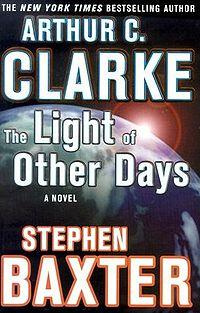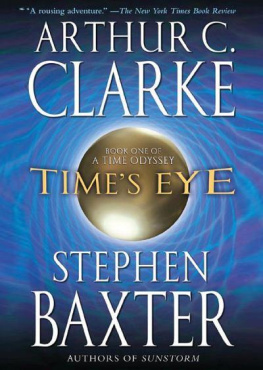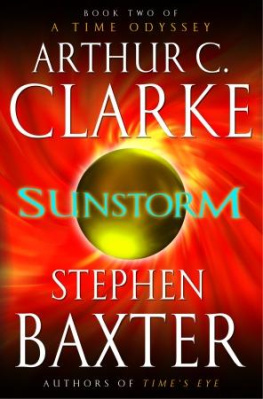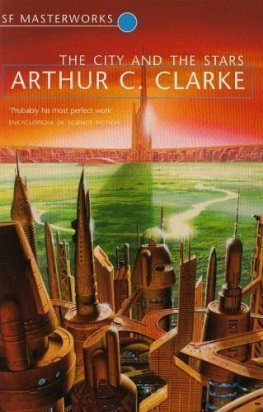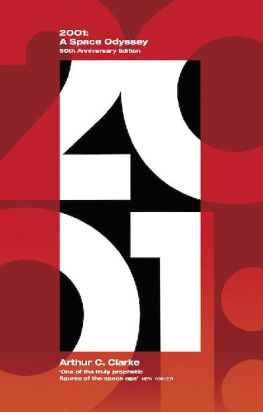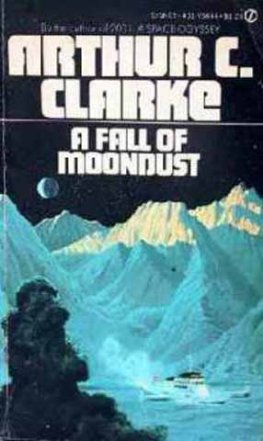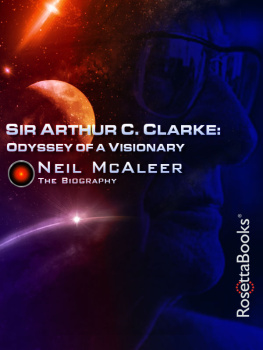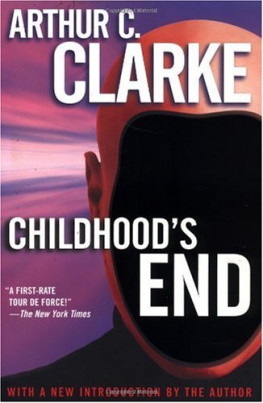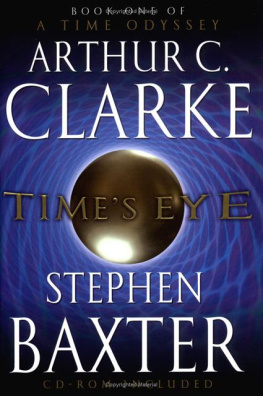Annotation
The crowning achievement of any professional writer is to get paid twice for the same material: write a piece for one publisher and then tweak it just enough that you can turn around and sell it to someone else. While it's specious to accuse Stephen Baxter and Arthur C. Clarke of this, fans of both authors will definitely notice some striking similarities between Light of Other Days and other recent works by the two, specifically Baxter's Manifold: Time and Clarke's The Trigger.
The Light of Other Days follows a soulless tech billionaire (sort of an older, more crotchety Bill Gates), a soulful muckraking journalist, and the billionaire's two (separated since birth) sons. It's 2035, and all four hold ringside seats at the birth of a new paradigm-destroying technology, a system of "WormCams," harnessing the power of wormholes to see absolutely anyone or anything, anywhere, at any distance (even light years away). As if that weren't enough, the sons eventually figure out how to exploit a time-dilation effect, allowing them to use the holes to peer back in time.
For Baxter's part, the Light of Other Days develops another aspect of Manifold's notion that humanity might have to master the flow of time itself to avert a comparatively mundane disaster (yet another yawn-inducing big rock threatening to hit the earth); Clarke, just as he did with Trigger's anti-gun ray, speculates on how a revolutionary technology can change the world forever.
The Light of Other Days
by Arthur C. Clarke & Stephen Baxter
Is it not possible -- I often wonder -- that things we have felt with great intensity have an experience independent of our minds; are in fact still in existence? And if so, will it not be possible, in time, that some device will be invented by which we can tap them? ...Instead of remembering here a scene and there a sound, I shall fit a plug into the wall; and listen in to the past...
--Virginia Woolf (1882-1941)
One
The goldfish bowl
We know how cruel the truth often is, and we wonder whether delusion is not more consoling.
--Henri Poincare (1884-1912)
Prologue
Bobby could see the Earth, complete and serene, within its cage of silver light.
Fingers of green and blue pushed into the new deserts of Asia and the North American Midwest. Artificial reefs glimmered in the Caribbean, pale blue against the deeper ocean. Great wispy machines laboured over the poles to repair the atmosphere. The air was clear as glass, for now mankind drew its energy from the core of Earth itself.
And Bobby knew that if he chose, with a mere effort of will, he could look back into time.
He could watch cities bloom on Earth's patient surface, to dwindle and vanish like rusty dew. He could see species shrivel and devolve like leaves curling into their buds. He could watch the slow dance of the continents as Earth gathered its primordial heat back into its iron heart. The present was a glimmering, expanding bubble of life and awareness, with the past locked within, trapped unmoving like an insect in amber.
For a long time, on this rich, growing Earth, embedded in knowledge, an enhanced humankind had been at peace: a peace unimaginable when he was born.
And all of this had derived from the ambition of one man -- a venal, flawed man, a man who had never even understood where his dreams would lead.
How remarkable, he thought.
Bobby looked into his past, and into his heart.
Chapter 1
The Casimir engine
A little after dawn, Vitaly Keldysh climbed stiffly into his car, engaged the SmartDrive, and let the car sweep him away from the run-down hotel.
The streets of Leninsk were empty, the road surface cracked, many windows boarded up. He remembered how this place had been at its peak, in the 1970s perhaps: a bustling science city with a population of tens of thousands, with schools, cinemas, a swimming pool, a sports stadium, cafes, restaurants and hotels, even its own TV station. Still, as he passed the main gateway to the north of the city, there was the old blue sign with its white pointing arrow: TO BAIKONUR, still proclaiming that ancient deceptive name. And still, here at the empty heart of Asia, Russian engineers built spaceships and fired them into the sky.
But, he reflected sadly, not for much longer.
The sun rose at last, and banished the stars: all but one, he saw, the brightest of all. It moved with a leisurely but unnatural speed across the southern sky. It was the ruin of the International Space Station: never completed, abandoned in 2010 after the crash of an ageing Space Shuttle. But still the Station drifted around the Earth, an unwelcome guest at a party long over.
The landscape beyond the city was barren. He passed a camel standing patiently at the side of the road, a wizened woman beside it dressed in rags. It was a scene he might have encountered any time in the last thousand years, he thought, as if all the great changes, political and technical and social, that had swept across this land had been for nothing. Which was, perhaps, the reality.
But in the gathering sunlight of this spring dawn, the steppe was green and littered with bright yellow flowers. He wound down his window and tried to detect the meadow fragrance he remembered so well; but his nose, ruined by a lifetime of tobacco, let him down. He felt a stab of sadness, as he always did at this time of year. The grass and flowers would soon be gone; the steppe spring was brief, as tragically brief as life itself.
He reached the range.
It was a place of steel towers pointing to the sky, of enormous concrete mounds. The cosmodrome -- far vaster than its western competitors -- covered thousands of square kilometres of this empty land. Much of it was abandoned now, of course, and the great gantries were rusting slowly in the dry air, or else had been pulled down for scrap -- with or without the consent of the authorities.
But this morning there was much activity around one pad. He could see technicians in their protective suits and orange hats scurrying around the great gantry, like faithful at the feet of some immense god.
A voice floated across the steppe from a speaker tower. Gotovnosty dyesyat minut. Ten minutes and counting.
The walk from the car to the viewing stand, short as it was, tired him greatly. He tried to ignore the hammering of his recalcitrant heart, the prickling of sweat over his neck and brow, his gasping breathlessness, the stiff pain that plagued his arm and neck.
As he took his place those already here greeted him. There were the corpulent, complacent men and women who, in this new Russia, moved seamlessly between legitimate authority and murky underworld; and there were young technicians, like all of the new generations rat-faced with the hunger that had plagued his country since the fall of the Soviet Union.
He accepted their greetings, but was happy to sink into isolated anonymity. The men and women of this hard future cared nothing for him and his memories of a better past.
And nor did they care much for what was about to happen here. All their gossip was of events far away: of Hiram Patterson and his wormholes, his promise to make the Earth itself as transparent as glass.
It was very obvious to Vitaly that he was the oldest person here. The last survivor of the old days, perhaps. That thought gave him a certain sour pleasure.
It was, in fact, almost exactly seventy years since the launch of the first Molniya -- "lightning" -- in 1965. It might have been seventy days, so vivid were the events in Vitaly's mind, when the young army of scientists, rocket engineers, technicians, labourers, cooks, carpenters and masons had come to this unpromising steppe and -- living in huts and tents, alternately baking and freezing, armed with little but their dedication and Korolev's genius -- had built and launched mankind's first spaceships.

